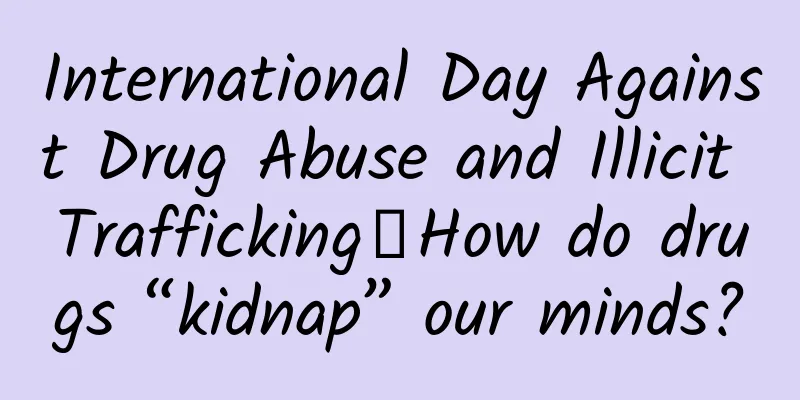International Day Against Drug Abuse and Illicit Trafficking丨How do drugs “kidnap” our minds?

|
Drugs not only damage physical health, but also lead to crime, harm families and society. Moreover, the harm of drugs is not limited to race, gender and age. Anyone may be harmed by it. Therefore, drug control is not only a national policy, but also the responsibility of every citizen. Today is the International Day Against Drug Abuse and Illicit Trafficking. Let's talk about the psychological mechanism of drug addiction and why it is difficult to quit drugs. How did addiction come about? People often think that a person who is addicted to drugs cannot quit because he has weak willpower and cannot control himself. But this is not entirely true. Before we begin, we can briefly understand how our brain forms "addiction". The human brain can secrete a variety of chemicals to regulate our physiological and psychological activities. For example, dopamine can make people feel happy, serotonin can relieve pain, and adrenaline can regulate blood pressure and breathing... These chemicals can be collectively called neurotransmitters. They can give people different feelings after binding to special structures (receptors) in the brain. Neurotransmitters are like a large number of keys of different models. They can open different switches in the brain and make people feel pleasure, satisfaction, happiness, pain, sadness and other emotions. (Copyrighted image from the gallery, no permission to reprint) In our daily lives, people are more willing to repeat things that make them happy. This process is called positive feedback. Appropriate exercise can release dopamine, making us feel relaxed and fall in love with sports. Getting high scores in exams and overcoming difficult problems at work can bring a great sense of accomplishment and satisfaction. This feeling of happiness makes us willing to continue to accept challenges. The process of repeating a certain behavior in order to avoid pain or punishment is called negative feedback. For example, if a project fails, we will feel sad and lost, and if we are criticized and punished for not completing our work, we will work harder to complete the task to avoid punishment. In order to gain happiness, we will repeat behaviors that make us feel happy. In order to avoid pain, we will do things that can avoid pain. We experience the feelings we want, and further increase the number of corresponding behaviors. This is the process of "addiction". How drugs hijack your brain Everything we experience in life can cause the brain to secrete different neurotransmitters, which in turn produce a variety of emotions. Drugs have similar functions to the above neurotransmitters, but they can give the brain a stronger sensory stimulation. Drug addiction is a process that slowly turns from positive feedback to negative feedback. When first using drugs, the user will feel a strong sense of pleasure, which can prompt him to repeat the behavior more often. At this time, it is still a positive feedback process. However, drugs can damage the neurotransmitter receptors in the brain, resulting in a decrease in the sites where drugs can bind in the brain. The same dose is not enough to bring the same degree of pleasure. As time goes by, drug users need to take higher doses of drugs to achieve the same pleasure. At this time, users often fall into the trap of negative feedback. They experience great pain. In order to relieve the pain, they have to continue taking drugs and are completely controlled by drugs. (Copyrighted image from the gallery, no permission to reprint) The sudden interruption of this physiological dependence will disrupt the body's balance. When drug addiction occurs, the body will ache, tear, twitch, feel dizzy, and have confusion. These painful experiences during withdrawal force users to continue using drugs to relieve symptoms. Over time, this behavior pattern will become a habit and eventually turn into drug addiction. Is drug addiction just physical dependence? Drug addiction is not just a simple physical dependence, but also a psychological dependence. Physical addiction can be gradually eliminated through scientific treatment, but it is relatively difficult to get rid of psychological addiction. The cognitive arousal theory believes that in different situations, some objects or events will awaken some memories buried deep in the heart. As the saying goes, seeing things reminds you of people. Due to different life experiences, some objects or people have special meanings. For you, an object may not touch you at all, but another person will be very emotional when seeing it, or even cry with excitement. (Copyrighted image from the gallery, no permission to reprint) When ordinary people see instruments such as syringes, they only think of hospitals and medical workers, but for drug addicts, it is the pleasure of taking drugs and the pain of withdrawal. Even if a person successfully quits drugs physically and no longer comes into contact with drugs, his body will still retain strong habits and psychological imprints. Even if a former drug user has quit drugs for more than ten years, when he sees the tools of taking drugs again or watches movies and TV shows about drug use, the deepest memories of drug use in his mind will still be awakened. Then his body will still shed tears, tempting him to desire drugs. If the client cannot get effective help at this time, then the possibility of relapse is very high, and the results of more than ten years of drug rehabilitation will be lost. So from this perspective, psychological drug addiction ignores time and space, and even the simple fantasy of the client can be activated, which is one of the key reasons why drug addiction is extremely difficult to completely eradicate. Will drug addicts find it difficult to break free from their addiction for life? The process of drug rehabilitation is long and painful, and it is not something that can be achieved with strong willpower. Once a person falls into a drug addiction state, his or her mental and physical condition will gradually deteriorate, and his or her long-term happiness and quality of life will suffer a major impact. Drug addiction and mental health are closely related to each other. In the process of drug rehabilitation, mental health treatment is very important. 1. Facing drug addiction is the first step to solving the problem Avoidance cannot solve the problem. Addicts must accept the fact that they are addicted to drugs and bravely seek help and support from friends, family, and doctors around them, share their thoughts, emotions, and conditions with them, accept their support and care, and alleviate the pain and pressure caused by loneliness and self-denial. 2. Maintain a healthy sense of self Believe that you can persist in quitting, change your bad habits and way of thinking, and learn to face the challenges of life correctly. Participate in psychotherapy and learn how to relieve anxiety, depression and other negative emotions, as well as enhance personal psychological resilience and stress management ability. Do not escape the emptiness and boredom of life through the wrong means. 3. Avoid any scenes or objects that trigger drug-taking memories The practice of "knowingly going to the tiger mountain" is very dangerous when applied to drug rehabilitation. It is one of the high-risk behaviors that lead to relapse when appearing in drug abuse scenes. Drug rehabilitation should rely on long-term persistence in a scientific system, not just a contest of willpower. Not testing yourself and not exposing yourself to relevant scenes can effectively restrain your desire for drugs. This is also the simplest and most effective approach. (Copyrighted image from the gallery, no permission to reprint) Drug addiction treatment is a difficult and long process, but it is also a process full of hope and opportunity, which requires firm belief and the right attitude. As long as you actively seek help and treatment, persist in rehabilitation training, and gradually recover your body functions, you may be able to successfully overcome drug addiction and regain freedom and happiness in life. author: Wang Xiang: Chief Writer of Beijing China Science Popularization Mental Health Promotion Center Tang Yicheng: China Science Popularization Expert, Secretary General of the Science Popularization Committee of the Chinese Psychological Society Produced by: Science Popularization China Produced by: China Science and Technology Press Co., Ltd., China Science and Technology Publishing House (Beijing) Digital Media Co., Ltd. |
<<: How terrible would it be to have a major earthquake that caused the fall of an empire?
>>: Awesome! This asteroid is named after a Taizhou person
Recommend
Polestar cuts 15% of its global workforce, Geely Auto's multi-brand globalization strategy faces challenges
Swedish electric car maker Polestar said recently...
#千万IP创科普# The common nighthawk, who is proficient in "camouflage" technology, is not ordinary at all
A bird's eye view of science Quanzhou Associa...
Why didn’t the activities you planned work?
Event operation is an explosive operation method ...
Taking on alpine skiing? Wind tunnel 3D modeling to help
Light a cigarette, the wind starts to blow. In th...
Every sip is fatal! Drinking this kind of beverage frequently can easily lead to cardiovascular disease and liver cancer
What can bring happiness to people quickly? Vario...
The beautiful sunset can actually be predicted. When do you think it will appear again?
On May 14, the news that "a beautiful sunset...
9 thoughts behind private domain traffic, fission, and sinking market
The topic of private domain traffic has become in...
Don’t panic if you lose your phone. Do these four things as soon as possible to avoid financial loss. Learn them now.
Mobile phones are the most frequently used electr...
Marketing automation rapid ranking SEO optimization training case!
SEO training case: When we do SEO optimization, s...
Activity operation, a complete analysis of the gameplay of flash sales activities
618 is getting closer, and major e-commerce websi...
These 3 key points can save you 50% of your promotion costs!
Whether for marketers or operators , advertising ...
"The girl was killed because Qvod was blocked" is pure conjecture
Using the murder of a girl as a basis for judging...
Why did my website ranking drop so much all of a sudden? See if you have touched the Baidu algorithm!
If you want traffic to your website but don’t wan...
Viral communication case analysis: Why did “Watermelon Footprints” go viral on WeChat Moments?
On May 31, the Moments were suddenly flooded with...
The latest news on oil price adjustment on April 15, 2022: How much will it be reduced? Attach details
Since the beginning of this year, oil prices in m...









